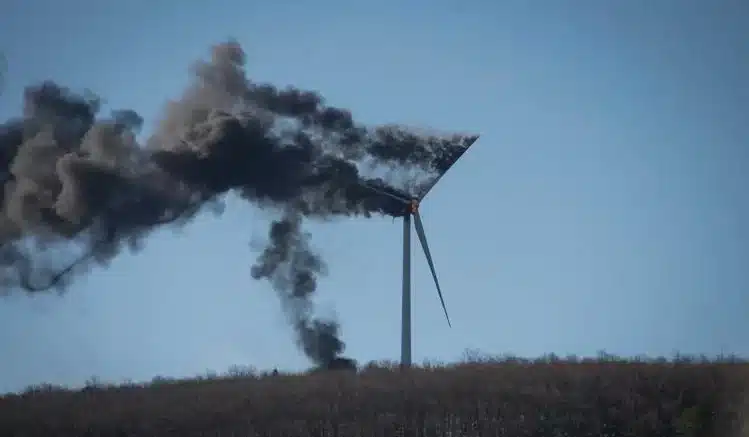The American Revolt Against Green Energy Has Begun
 The only way to protect your city or town from the destruction that always follows windmills and solar panels is to prevent their construction in the first place. Besides the eyesores, sound fatigue, pollution, dead birds, etc., your electricity rates will soar. Many cities are finally figuring this out and are saying NO MORE! — Technocracy News & Trends Editor Patrick Wood
The only way to protect your city or town from the destruction that always follows windmills and solar panels is to prevent their construction in the first place. Besides the eyesores, sound fatigue, pollution, dead birds, etc., your electricity rates will soar. Many cities are finally figuring this out and are saying NO MORE! — Technocracy News & Trends Editor Patrick Wood
By: David Blackmon via The Telegraph
In a story filled with all the standard climate alarmist narratives, USA Today recently reported on the rising movement by local governments in the United States to refuse to permit unwanted wind and solar industrial sites in their jurisdictions.
After setting the stage by parroting the Biden administration goals of “100 per cent clean energy by 2035, a goal that depends on the building of large-scale solar and wind,” USA Today points to the reality that such big, intrusive, ugly, and destructive industrial sites have been rejected by twice as many county governments as approved them. The writers complain that the rejections come about by some combination of “outright bans, moratoriums, construction impediments and other conditions that make green energy difficult to build,” but don’t go on to describe why the rejections are taking place.
Simply put, these huge industrial sites – we simply must stop using the friendly-sounding term “farms” to describe them – create all manner of negative consequences for local communities. Consequences like loud noise from wind turbines, hundreds of dead birds and bats sprinkled across the countryside, thousands of acres of productive farm or ranchlands taken out of production for many years if not permanently, spoiled views, enormous “graveyards” filled with 150-foot blades and solar panels popping up all over the place, and impacts to local wind and weather patterns that are only now beginning to be understood.
Those consequences and more have become increasingly clear as time has progressed, and that is making it harder for developers to gain acceptance from the communities that would serve as hosts. Such pushback is likely to grow more strident in the coming years as it becomes clear to citizens that their state governments have failed to enact effective regulatory structures requiring timely and full retirement and remediation of these industrial sites when their useful life has expired. By that time, these sites will most likely have been sold off by the big developers who built them to smaller companies that will be unlikely to be able to bear the enormous costs involved in full removal and remediation.
But by then, it will be too late for the communities to protect their rights. The only real way to protect a city or county from these myriad impacts is to refuse to allow them to be built.
Fortunately, the US legal system has been built in a way that protects the rights of all stakeholders to any industrial development. Those stakeholders include local citizens, their businesses, their local infrastructure, their archeological sites, and their government entities – those are givens. But US society has seen fit over the decades to extend similar protections to animals, plants, the water, and the air as well.
Whenever we hear developers of energy or any other industrial projects complain of lengthy and complex permitting processes with which they must comply, we must remember that almost all the hurdles they must overcome to obtain their permits relate to regulations designed to protect these stakeholder rights. In the US, those regulations relate to major environmental statutes like the Clean Air Act, the Clean Water Act, the Endangered Species Act, the National Environmental Policy Act, and others, like the Antiquities Act. The term “streamlining permitting” is in fact code for scaling back on those stakeholder protections.
This is the clear trade-off with which the US and other western democracies must grapple if they are to achieve their climate goals. We must recognize that essentially every “solution” that has been advanced by the climate alarmist community and the globalist elites pushing their agenda requires the implementation of authoritarian policies designed to scale back stakeholder rights, pick winners and losers in the marketplace, and force reluctant consumers to pay the price.
These kinds of forced solutions are in fact incompatible with the maintenance of a free society that protects the rights of all stakeholders. That reality is the central conundrum of this forced, heavily subsidized energy transition – which is not, in fact, a transition at all – and it is the reason why so many local governments are rejecting these proposed industrial sites. The climate alarmists understand this, which is why their rhetoric has grown more shrill and heated over time.
In democracies, we decide major issues like this through elections. So long as we ensure those elections are conducted freely and fairly, it seems unlikely voters will be willing to surrender their rights in favor of achieving nebulous climate goals.
Sourced from: Technocracy News & Trends
Become a Patron!
Or support us at SubscribeStar
Donate cryptocurrency HERE
Subscribe to Activist Post for truth, peace, and freedom news. Follow us on SoMee, Telegram, HIVE, Minds, MeWe, Twitter – X, Gab, and What Really Happened.
Provide, Protect and Profit from what’s coming! Get a free issue of Counter Markets today.




